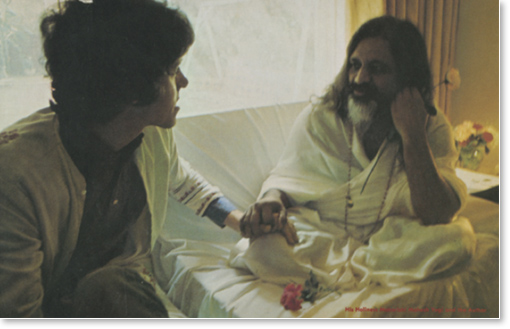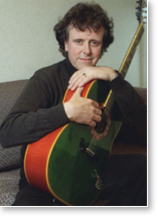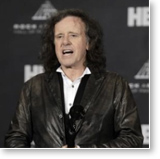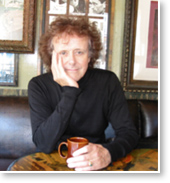 This past weekend legendary singer, songwriter and folk-rocker Donovan was inducted into the Rock and Roll Hall of Fame, along with Guns N’ Roses, Red Hot Chili Peppers, Laura Nyro, and The Miracles.
This past weekend legendary singer, songwriter and folk-rocker Donovan was inducted into the Rock and Roll Hall of Fame, along with Guns N’ Roses, Red Hot Chili Peppers, Laura Nyro, and The Miracles.
In this recent article in Billboard magazine Donovan talks about the impact that learning the Transcendental Meditation technique had on his music and his life, and his work for the David Lynch Foundation to develop the creativity of children by providing the Quiet Time/TM Program in schools all over the world.
Here are excerpts from that article:
Billboard: Last year we heard a new song from you, “Listen.” As one of the first and most visible people to experience TM in India, how has it affected your music?
 Donovan: In the early days when the Beatles and I went to India and returned, we knew our fans should have it and then the world should have it. We needed it. Flash forward 35 years later [April 4, 2009] and Paul [McCartney] and Ringo [Starr] and Donovan and David Lynch are on the stage at Radio City Music Hall announcing to the world how schools have applied this meditation. Fear and anger and doubt have been subdued somewhat. It doesn’t mean that you’ll never be angry or filled with doubt again, but you won’t hold on to it — all things the Maharishi spoke of. This one was designed to be very applicable to the Western way of thinking. My dream was to [figure out] how do we bring in a new generation of songwriters? As it progressed, I wrote songs with meditation in them. The Beatles wrote songs with meditation in them.
Donovan: In the early days when the Beatles and I went to India and returned, we knew our fans should have it and then the world should have it. We needed it. Flash forward 35 years later [April 4, 2009] and Paul [McCartney] and Ringo [Starr] and Donovan and David Lynch are on the stage at Radio City Music Hall announcing to the world how schools have applied this meditation. Fear and anger and doubt have been subdued somewhat. It doesn’t mean that you’ll never be angry or filled with doubt again, but you won’t hold on to it — all things the Maharishi spoke of. This one was designed to be very applicable to the Western way of thinking. My dream was to [figure out] how do we bring in a new generation of songwriters? As it progressed, I wrote songs with meditation in them. The Beatles wrote songs with meditation in them.

Donovan and Maharishi Mahesh Yogi
Billboard: What was the first song you were aware of writing because of TM?
 Donovan: “Happiness Runs” is the most direct one, which I wrote while in India with the Beatles and one Beach Boy (Mike Love) and Mia Farrow. Before India in ’68 I was always looking for songs where people could sing along. It’s part of the job to be a poet, folk singer — children’s songs, rounds, circular songs. And so I made this circular song “Happiness Runs” and it directly references meditation because it says ‘happiness runs in a circular motion/thought is like a little boat upon the sea.’ Simple words, but profound. More rocking was the “Hurdy Gurdy Man.” In the 18th century the hurdy gurdy man played the instrument the hurdy gurdy and he traveled from town to town and he brought the news. So I related the hurdy gurdy man in the song to the teacher, the Maharishi, who brings us songs of love.
Donovan: “Happiness Runs” is the most direct one, which I wrote while in India with the Beatles and one Beach Boy (Mike Love) and Mia Farrow. Before India in ’68 I was always looking for songs where people could sing along. It’s part of the job to be a poet, folk singer — children’s songs, rounds, circular songs. And so I made this circular song “Happiness Runs” and it directly references meditation because it says ‘happiness runs in a circular motion/thought is like a little boat upon the sea.’ Simple words, but profound. More rocking was the “Hurdy Gurdy Man.” In the 18th century the hurdy gurdy man played the instrument the hurdy gurdy and he traveled from town to town and he brought the news. So I related the hurdy gurdy man in the song to the teacher, the Maharishi, who brings us songs of love.
—————————-
Click below to watch a 1964 video of Donovan singing one of his award-winning songs — “Catch the Wind.”
—————————-
Billboard: When you said meditation affected your songwriting, the first thing I thought of was “There is a Mountain.” What’s its origin?
 Donovan: It comes from a Zen haiku, but it is a koan as well — the clever question asked of the student by the Zen master. “First there is a mountain, then there is no mountain, then there is.” “The caterpillar sheds its skin/to find the butterfly within.” It’s very literal. If we could discard our skin, our hard husk of persona, it’s an obvious description that inside there is a softer human. I found (sayings) in old books and by putting them into songs, I hoped they would trigger a question in the listener. By giving it a rhythm it has an attraction — people were singing my lyrics not knowing what they were about.
Donovan: It comes from a Zen haiku, but it is a koan as well — the clever question asked of the student by the Zen master. “First there is a mountain, then there is no mountain, then there is.” “The caterpillar sheds its skin/to find the butterfly within.” It’s very literal. If we could discard our skin, our hard husk of persona, it’s an obvious description that inside there is a softer human. I found (sayings) in old books and by putting them into songs, I hoped they would trigger a question in the listener. By giving it a rhythm it has an attraction — people were singing my lyrics not knowing what they were about.
Billboard: At some point early on, you made the decision to write songs, which many folk singers of the early 1960s did not do.
 Donovan: I much more wanted to be recognized as a poet than as a musician. Poetry is still looked upon as something ineffectual, narcissistic. In actual fact, the Bohemian poets in the ’40s, their mission was to return poetry to popular culture. When you bring a poet into popular culture, two lines from a poem can alter a whole nation, it can bring a government down. The beat poets were wrong when they thought poetry would come back on the wings of jazz. Some poets were improvising with jazz improvisers in clubs, but improvisational poetry only works within improvisational music. When folk jumped into bed with rock, the form of the folk ballad would allow the new lyric (to thrive), first with Bobby Dylan then with myself and Joni Mitchell, Leonard Cohen, Neil Young. The Beatles realized it, too. They were from the Irish tradition of social activism [in poetry] but didn’t know it. I somehow knew it, because my father had brought me up reading poetry to me of social change. Before I heard Woody Guthrie, my father was reading poems of social consciousness to me — Wordsworth, Coleridge, Shelly. I got fired with the zeal that we could bring something [literate] to the fans of pop music to get their teeth into.
Donovan: I much more wanted to be recognized as a poet than as a musician. Poetry is still looked upon as something ineffectual, narcissistic. In actual fact, the Bohemian poets in the ’40s, their mission was to return poetry to popular culture. When you bring a poet into popular culture, two lines from a poem can alter a whole nation, it can bring a government down. The beat poets were wrong when they thought poetry would come back on the wings of jazz. Some poets were improvising with jazz improvisers in clubs, but improvisational poetry only works within improvisational music. When folk jumped into bed with rock, the form of the folk ballad would allow the new lyric (to thrive), first with Bobby Dylan then with myself and Joni Mitchell, Leonard Cohen, Neil Young. The Beatles realized it, too. They were from the Irish tradition of social activism [in poetry] but didn’t know it. I somehow knew it, because my father had brought me up reading poetry to me of social change. Before I heard Woody Guthrie, my father was reading poems of social consciousness to me — Wordsworth, Coleridge, Shelly. I got fired with the zeal that we could bring something [literate] to the fans of pop music to get their teeth into.
—————————-
To read the entire article online at Billboard.com, CLICK HERE
—————————-
 Note: a 90 minute version of the 2009 “Change Begins Within” concert that Donovan participated in and that featured a historic reunion of Beatles Paul McCartney and Ringo Starr is scheduled to premier on PBS in NYCity later this month.
Note: a 90 minute version of the 2009 “Change Begins Within” concert that Donovan participated in and that featured a historic reunion of Beatles Paul McCartney and Ringo Starr is scheduled to premier on PBS in NYCity later this month.
Also appearing on this PBS special are comedian Jerry Seinfeld as well as musicians Sheryl Crow, Eddie Vedder, Ben Harper, Moby, Jim James, as well as newly-elected Rock-and-Roll-Hall of Famer Donovan.
CLICK HERE for an announcement of this upcoming PBS program.
—————————-



